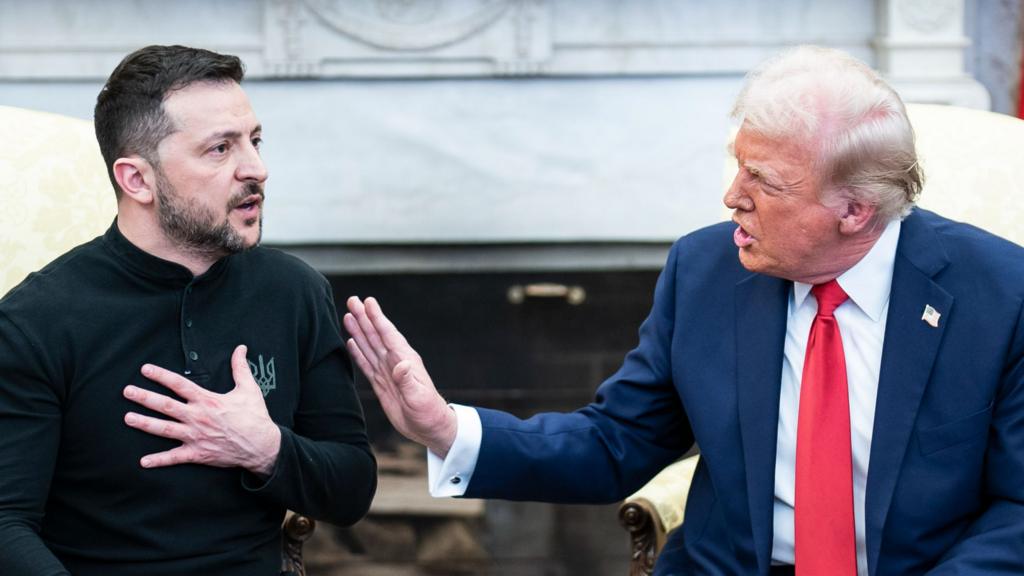TRUMP – ZELENSKYY AND THIRD WORLD WAR

When you think about Donald Trump, Volodymyr Zelenskyy, and the looming fear of a third world war, it’s impossible not to see how deeply intertwined their stories are with today’s biggest global challenges. These two leaders—one from a superpower, the other from a nation under siege—have influenced the way we view international politics and conflict. And as the Ukraine war continues to simmer, the question many people are quietly asking is: Could this be the spark for a global catastrophe?
Let’s break it down.
Trump’s Foreign Policy and Ukraine: A Complicated Legacy
Donald Trump’s presidency was nothing if not unconventional. His “America First” approach shook up how the U.S. interacted with the world. It was clear from the start that Trump wasn’t interested in playing by the traditional rules of diplomacy. This had both good and bad consequences, especially when it came to Ukraine.
Remember that phone call in 2019? The one where Trump spoke with Zelenskyy and reportedly asked him to investigate Joe Biden and his son, Hunter? That single call set off a chain of events that led to Trump’s first impeachment. At the heart of it was the allegation that Trump delayed military aid to Ukraine as leverage—a move critics said weakened Ukraine’s position against Russia.
But here’s where it gets tricky: Trump’s administration actually gave Ukraine something it desperately needed—lethal aid, like Javelin missiles. These weapons became crucial for Ukraine’s defense against Russian tanks. So, while Trump’s rhetoric often seemed to favor Putin, his actions sometimes told a different story.
However, Trump’s broader approach to NATO and Europe left allies uneasy. His public questioning of NATO’s value and his mixed messages about standing up to Russia made some wonder whether the U.S. was still the leader of the free world.
Zelenskyy: From Comedian to Wartime Leader
Volodymyr Zelenskyy’s journey to Ukraine’s presidency feels like something out of a movie. A comedian and actor with no political experience, he was elected in 2019 on promises to fight corruption and bring change. But instead of getting time to push through reforms, he found himself at the helm of a nation facing Russia’s aggression.
When Russia launched its full-scale invasion in February 2022, Zelenskyy rose to the occasion in ways few expected. His defiance and determination turned him into a global symbol of resilience. Think about it—how many leaders would stay in a war-torn capital while missiles rained down, refusing offers of evacuation? Zelenskyy did.
His speeches, often delivered via video to parliaments and summits, have been powerful calls to action. “We need weapons. We need sanctions. We need help.” He’s not just fighting for Ukraine’s survival; he’s framing this war as a fight for democracy itself.
But Zelenskyy’s push for more Western involvement—like asking NATO to enforce a no-fly zone—hasn’t always been met with open arms. NATO allies worry that such moves could pull them directly into conflict with Russia, sparking the global war everyone fears.
The Fear of World War III
Let’s not sugarcoat it: The Ukraine war has brought us closer to the edge of a global conflict than we’ve been in decades. The stakes are incredibly high because this isn’t just about Ukraine. It’s about the balance of power between Russia, NATO, and the rest of the world.
Russia sees NATO’s expansion as a direct threat. When Ukraine began leaning Westward—seeking closer ties with the European Union and NATO—Russia decided to act. For Putin, Ukraine isn’t just another neighbor; it’s a key part of Russia’s sphere of influence.
The danger is that this conflict has all the ingredients for escalation. NATO countries are supplying Ukraine with weapons and intelligence, but they’ve stopped short of direct involvement. Still, one mistake—a stray missile, a miscalculated response—could ignite something much larger.
And then there’s the nuclear question. Putin has hinted more than once that Russia wouldn’t hesitate to use nuclear weapons if it felt backed into a corner. That’s a terrifying thought and a reminder of how fragile peace can be.
What Would Trump Do?
Trump’s approach to the Ukraine crisis, had he still been president, is anyone’s guess. Some believe his relationship with Putin might have deterred the invasion altogether. Trump himself has said that Biden’s handling of the situation could lead to World War III.
But it’s worth remembering that Trump’s foreign policy often left allies scratching their heads. He criticized NATO but also demanded more contributions from member states. He cozied up to strongmen like Putin while simultaneously approving arms sales to counter Russian aggression. Would his unpredictable style have helped or hurt in the current crisis? It’s hard to say.
Zelenskyy’s Role in Preventing Escalation
Zelenskyy has made it clear that he doesn’t just want help—he needs it. His pleas for fighter jets, air defense systems, and financial support have kept Ukraine in the global spotlight. And while his leadership has won him admirers, it’s also raised tough questions. How far can the West go in supporting Ukraine without provoking a direct confrontation with Russia?
Zelenskyy’s call for a no-fly zone, for example, was met with a firm “no” from NATO. Why? Because enforcing it would mean NATO jets shooting down Russian planes—a direct path to war. It’s a heartbreaking dilemma: How do you help a country fight for its survival without risking an even bigger conflict?
The Bigger Picture
Ukraine is at the center of a much larger struggle. For the West, it’s a fight to defend democracy and the rules-based international order. For Russia, it’s about resisting what it sees as Western encroachment on its borders.
This isn’t just about two nations. It’s about a world grappling with shifting power dynamics. The U.S. is no longer the uncontested leader it once was. China is rising, Russia is pushing back, and alliances are being tested.
And while we’re not in a third world war yet, the risk is real. The Ukraine conflict has shown how quickly regional tensions can spiral into global crises.

